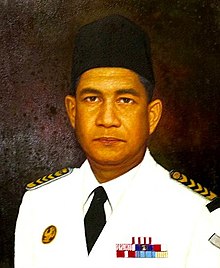Tjilik Riwut | |
|---|---|
 Official portrait, date unknown | |
| 2nd[b] Governor of Central Kalimantan | |
| In office 23 December 1959[a] – 17 February 1967 | |
| Deputy | Reinout Sylvanus |
| Preceded by | R. T. A. Milono |
| Succeeded by | Reinout Sylvanus |
| Personal details | |
| Born | 2 February 1918 Kasongan, Katingan, Southern and Eastern Afdeelings of Borneo Residency, Dutch East Indies |
| Died | 17 August 1987 (aged 69) Banjarmasin, South Kalimantan, Indonesia |
| Resting place | Sanaman Lampang Heroes Cemetery, Palangka Raya |
| Spouse | Clementine Suparti |
| Children | 5 |
| Alma mater | Indonesian Air Force Academy |
| Military service | |
| Allegiance | |
| Branch/service | Indonesian Air Force |
| Rank | Air Commodore |
| Unit | Paskhas |
Anakletus Tjilik Riwut (2 February 1918 – 17 August 1987) was an Indonesian military officer and journalist who served as the governor of Central Kalimantan from 1959 to 1967. He participated in the Indonesian National Revolution, becoming one of the leaders of the Kalimantan Physical Revolution in Dutch Borneo. In 1988, the government of Indonesia declared him a national hero.
Born in Kasongan, Katingan, Central Kalimantan, on 2 February 1918, to a Ngaju tribe family, he completed his elementary school education in his hometown of Kasongan.[2] Then he migrated to Java to continue his studies at the Peraaat School in Purwakarta and Bandung. He became a member of the Central Indonesian National Committee (KNIP), but he later joined the Armed Forces of the Republic of Indonesia (ABRI) and attained the rank of Major and later First Marshal, by fighting the Dutch colonial authorities and leading the first Parachute Operation in the history of ABRI. He also succeeded in fully integrating the Dutch portion of Borneo into Indonesia.[3]
After the recognition of Indonesian sovereignty by the Dutch on 27 December 1949, Tjilik Riwut took part in the regional government of Kalimantan. Becoming the Wedana of Sampit,[4] the Regent of Kotawaringin,[5] the coordinator of isolated tribal communities for the entire interior of Kalimantan,[4] and a member of the People's Representative Council and the Supreme Advisory Council.[6] Tjilik Riwut then became the military governor of the Central Kalimantan region in 1958. During his tenure, he negotiated and protected the region from the Darul Islam and Mandau Talawang Pancasila rebellions.[7] He also mediated the selection of the provincial capital to avoid further conflicts between competing Dayak tribes by choosing the village of Pahandut, which is now Palangka Raya.[8] He officially became the second governor of Central Kalimantan in 1958, but wasn't inaugurated until 23 December 1959.
Following the aftermath of the 30 September Movement, he was forced to resign in February 1967, due to his close association with president Sukarno, whom he was friends with.[9] He died on 17 August 1987 in Banjarmasin due to complications from hepatitis and was buried in Sanaman Lampang Palangka Raya Heroes Cemetery. He was declared an Indonesian National Hero on 6 November 1988. The biggest airport in Central Kalimantan, Tjilik Riwut Airport, is named after him.[6] In 2018, government of Palangka Raya city built a statue of him in the middle of the city.[10]
- ^ a b Patianom 1992, p. 53.
- ^ Tabengan 2021.
- ^ Kompas 2021.
- ^ a b Tirto 2019.
- ^ Klinker 2006, p. 37.
- ^ a b Daerah Kita 2020.
- ^ Klinker 2006, p. 39.
- ^ Hakim 2003, pp. 8–13.
- ^ Muammar 2017.
- ^ City government of Palangka Raya 2018.
Cite error: There are <ref group=lower-alpha> tags or {{efn}} templates on this page, but the references will not show without a {{reflist|group=lower-alpha}} template or {{notelist}} template (see the help page).